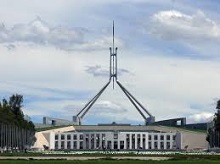Malcolm Turnbull was talking up his victory, saying the people had put its faith in his team, just as Labor took the lead by eight votes in Herbert (I think there are a few hundred votes to count, before the recount) and the Senate was far from settled.
He said the next term would be a term of “delivery” of his “strong plan”. He’ll have to shake a leg, because parliament won’t meet until 30 August, which could give him around two years. More about that soon.
The full ministry is at Wikipedia, but here are the main changes:
Cabinet changes
-
Fiona Nash – adds Local Government and Territories to Regional Development
Christopher Pyne – new role of Minister for Defence Industry
Greg Hunt – moves from environment to Industry, Innovation and Science
Josh Frydenberg – adds environment to his role as Energy Minister
Matt Canavan – new Minister for Resources and Northern Australia
Kelly O’Dwyer- axed as Small Business Minister and will now be called Minister for Revenue and Financial Services instead of Assistant Treasurer
Outer ministry changes
-
Paul Fletcher – Minister for Urban Infrastructure
Scott Ryan – Special Minister of State
Dan Tehan – Minister for Defence Personnel and Minister for Veterans Affairs
Michael McCormack – Minister for Small Business
New or changed assistant ministers
-
Karen Andrews – Assistant Minister for Vocational Education and Skills
Alex Hawke – Assistant Minister for Immigration and Border Protection
Luke Hartsuyker – Assistant Minister to the Deputy Prime Minister
Zed Seselja – Assistant Minister for Social Services and Multicultural Affairs
David Gillespie – Assistant Minister for Rural Health
Keith Pitt – Assistant Minister for Trade, Investment and Tourism
Craig Laundy – Assistant Minister for Industry, Innovation and Science
Michelle Grattan provides a useful narrative of the changes.
Concerning climate change, the good news is that Greg Hunt has been punted sideways to Industry, Innovation and Science. Conceptually it’s also good news that Environment and Energy have been brought together under Josh Frydenberg. As John D said it:
- Has the potential to be just another weakening of the environmental dept but also has the potential to really drive the transition from fossil to renewable under someone who comes across as thoughtful and generally impressive.
However, Max Chalmers at New Matilda sounds a warning and bells the cat:
- Frydenberg has been a major advocate for coal, and has echoed Tony Abbott’s belief that the mineral is “good for humanity”. In an interview with Andrew Bolt last year, Frydenberg said “I certainly believe in the moral case that Tony Abbott and others have put that our coal, our gas, our energy supplies do lift people out of energy poverty, and that’s going to be an important theme of my term in this role.”
In the interview Bolt described the Minister as the “new Mr Coal”.
During the conversation the soon-to-be Environment Minister parroted Hunt’s defence of the government’s Direct Action climate change policy, and rehashed the claim that Adani’s planned mine in the Galilee basin would create 10,000 jobs – despite the fact Adani’s own expert witness quoted a far lower number to a Queensland court.
Also:
- Replacing Frydenberg as Minister for Resources is Senator Matt Canavan, who has said the science on climate change is becoming “less certain”.
“The evidence that there is dangerous climate change is not as strong and we should therefore not impose large costs on the global economy, especially for developing countries,” he argued in 2015.
Further than that it is likely that the Coalition Agreement with the Nationals, the one the public is not allowed to see, has thrown the anchor over the back end of the ship.
Turnbull has diminished the responsibilities of two women, as Michelle Grattan says:
- Victorian Kelly O’Dwyer is a major loser, with her small business job stripped away. Her assistant treasurer responsibilities have been renamed – she will now be called minister for revenue and financial services.
Pyne moves from industry minister to a new portfolio of defence industry, which gives him control over the shipbuilding industry – of vital importance to his home state of South Australia, and a big stake in the broad defence area.
As a consequence, Defence Minister Marise Payne loses some of her territory. Pyne is seen as a strong public advocate; in contrast Payne does not do a lot of media.
Christopher Pyne has a new role of Minister for Submarines Defence Industry in what looks like a largely political move.
Phillip Coorey has figured out that the next election may be just over two years away.
Half of the senators elected will serve a three-year term effective from July 1 this year to June 30, 2019. The latest he can have an election would be about mid-May 2019, which would make complications with the budget again. He can go as early as August 2018, but he would also need to consider the Victorian election scheduled for November 2018, and the NSW election scheduled in March 2019.
Parliament is being held up this time by the glacial senate count. After two years of the senate that emerges, Turnbull may have had enough.


Laura Tingle has an interesting commentary. In general she thinks Turnbull has demonstrated his authority, with the main concession to the Nationals, determined by the arithmetic of relative party representation. Then there is this: